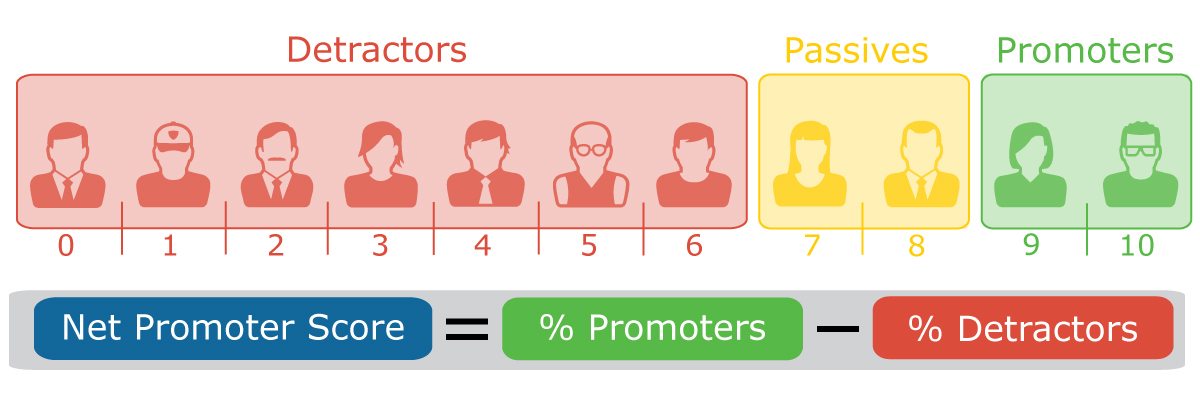What is Net Promoter Score?
Net Promoter Score (NPS) is a metric for measuring customer loyalty that was developed by Fred Reichheld, Bain & Co. and Satmetrix in the 1990s.They presented the method in the book, The Ultimate Question.
Your company’s NPS is based on one single “ultimate” question; What is the likelihood that you would recommend (our company) to a colleague or friend? You ask this question in a customer survey where the customer answers this question on a scale from 0-10. Where 0 means not likely at all and 10 means very likely. Depending on the answers, customers are divided into three different categories.
0-6 = “Critics ” or “Detractors”
7-8 = ” Passives”
9-10 = “Ambassadors” or ” Promoters”
Then, you calculate the Net Promoter Score:
NPS = percentage of Promoters − percentage of Detractors

Your Net Promoter Score changes as your customers change opinion
Sending out just one survey asking the NPS question will give you a static Net Promoter Score. Which you can use to compare your company with other companies and industries. Keep in mind, though, that customers often change their opinion over time and this will result in a score that changes regularly. Depending on a company’s size and customer base, NPS surveys are better conducted continuously. Ideally, you should identify your most important customer touch points, for example if a customer has been in contact with your support team or just bought one of your products. Then use those instances as a trigger to conduct your NPS surveys. This makes it possible for you to quickly offer redress to a dissatisfied customer or benefit from a satisfied customer by using their satisfaction as a promotional tool for your company.
Advantages of NPS: measure over time and compare with other companies

Net Promoter Score has become an increasingly popular method for measuring customer loyalty. Mainly because it is simple and creates a value that you can use to compare your company with others. A value score that provides a perspective of your position in relation to other companies and industries is easy to understand and means you don’t have to analyze the results of a large and complex survey. It also simplifies the process for communicating such a result internally and puts the focus on customer-related questions. NPS is appreciated because it is easy to measure over time, which gives the company ongoing updates of their customer loyalty levels.
Criticism of Net Promoter Score
The simplicity of Net Promoter Score’s methodology can be a disadvantage, according to some critics. Some say it is too simple, since it generates a figure for how willing customers are to recommend the company, without taking into account factors such as how satisfied customers are with different products or how well they know the brand. People are also more or less willing to recommend a company depending on what kind of products or services it provides.
It is also important to consider that your NPS can be misleading for several reasons. For example, a company can have 55% ambassadors and 30% critics, while another may have 25% ambassadors and 0% critics but both provide an NPS of 25.
Employee Net Promoter Score – measuring staff loyalty
The ultimate question can also be used for internal surveys. Employee Net Promoter Score ( ENPS ) measures how willing your employees are to recommend the company as a workplace to their friends and acquaintances.
Tell us your views on Net Promoter Score
What do you think about NPS as a metric for measuring and increasing customer loyalty? Is it something that you are working with today, or thinking of implementing in your business? Feel free to add your comments below or contact us if you have any questions.
* Net Promoter Score is a registered trademark of Fred Reichheld, Bain & Co. and Satmetrix.








 Copyright © 2024 Netigate AB, Drottninggatan 25, 111 51, Stockholm, Sverige
Copyright © 2024 Netigate AB, Drottninggatan 25, 111 51, Stockholm, Sverige 